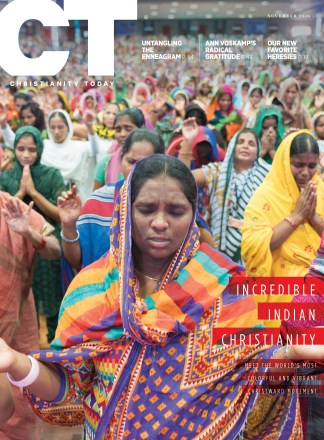Mark Teasdale began life in a “maverick” United Methodist church that emphasized evangelism more than most mainline brethren. When he grew up and moved away, he was shocked to find that many fellow Methodists thought of verbally sharing their faith as a foreign experience. Now, as a professor at Garrett-Evangelical Theological Seminary (a Methodist school on the campus of Northwestern University), Teasdale teaches a required evangelism course to students who are often wary, if not opposed outright, to the very idea that evangelism is valuable. Pastor and author Joshua Ryan Butler spoke with Teasdale about his book Evangelism for Non-Evangelists: Sharing the Gospel Authentically (IVP Academic).
What are some key stereotypes about evangelism that make some Christians uncomfortable sharing their faith?
Stephen Gunter, who teaches at Duke Divinity School, likes to joke that “for most Methodists, evangelism is that which we did not like having done unto us, which we feel obliged to do unto others.”
I start all my classes asking, “What was your worst experience with evangelism?” I’ve never had anyone say, “It’s always been great!” The negative experience has almost always been somebody preaching at them with a set of propositions, causing an awkward situation where they have to accept or reject the message. We give the impression that evangelism is only about verbal proclamation in monologue form.
You write that evangelism “trades in stories more than propositions.” What do you mean?
I’m not against truth propositions. But stories are important for a couple reasons. First, Christian faith is a story: the work of God through creation, the fall of humanity, and the establishing of a people, out of whom come the Messiah and redemption.
Second, this approach makes space for people to engage their own richly textured life stories. How do we acknowledge that, honor it, and reframe it in this larger narrative of who God is and how he operates?
Third, stories better prepare us for a life of discipleship, not least because they allow room for emphasis on joy. With propositions, it’s easy to get moralistic: “Here’s what we need to believe, so here’s how we need to act.” There’s certainly a moral life that flows out from following Jesus, but we need to guard against moralism, where morals become an idol.
You argue that evangelism isn’t the sole property of evangelicals. What are some positive emphases that other Christian traditions bring to the table?
When I first encountered liberation theology, I was shocked. Jesus didn’t seem very transcendent. But on the positive end, I came to recognize the important question it poses: “Do we really care about this world? Do we really care about the kingdom of God here and now rather than just later?”
Pentecostal theology adds a helpful insistence on the work of the Holy Spirit. Pentecostals recognize the reality of spiritual warfare—that we’re not fighting against flesh and blood. Where liberation theology emphasizes battling political structures, Pentecostals keep us from getting lost in that battle to the point of forgetting prayer, fasting, and reliance on the Holy Spirit.
The strength of Reformed evangelicalism has been its emphasis on proclaiming the Word. In my Wesleyan circles, there can be a slide into saying, “I just want my lifestyle to have a broad social witness”—we want to live the right way, but we avoid talking about Jesus.
Still, the Wesleyan tradition reminds us that discipleship is not just a one-time decision; every day we are in the process of being saved. When I accept Jesus, I have the assurance of salvation, but there’s a process of growing in holiness until I meet him face to face.
Many of us think of evangelism as something individuals do. What role does the body of Christ, as the community of faith, have in evangelism?
If you read the Great Commission and think, This is all on my shoulders, that’s really scary. I by myself can’t disciple all the nations. It’s freeing to realize you’re part of the body of Christ, and the whole body is called to invite people in.
God gives different gifts to different people, so that the whole body becomes a movement able to reach out and transform the world. What brings people into the body is not just a one-on-one relationship, but a community that immerses you into life with Christ together.
You talk about “God as evangelist” and how, under his sovereign rule, we have a “home field advantage.” How can this encourage those who are nervous to proclaim the Good News?
I know many people who pray for God to give them divine appointments to connect with somebody. They tell me, “It turns out God had already been at work in that person’s life!” So you’re not always starting something from scratch, with somebody who’s completely ignorant; you’re entering a process that’s already under way. We call it “prevenient grace”—that God’s gracious nature goes out to meet people where they are.
Our culture immerses us in narratives of the “good life,” and advertisers herald the “good news” of their products. Do our environments “evangelize” us? And if so, how can the gospel provide a sort of counter-evangelism?
I’m curmudgeonly enough that I don’t like using evangelism for talking about anything other than the work of God through Jesus Christ in the power of the Spirit. I know it gets used that way a lot. Google, for example, now has “evangelists” on staff who go around telling people about Googling things or sharing the “good news of Google.” It’s interesting that they’re trying to reclaim the word, but there’s only one Good News that needs to be shared.
That said, all kinds of influences and influencers out there are trying to shape and form us. The marketplace or the political scene, for instance. My office is just across the parking lot from the Kellogg School of Management, where they’re teaching people how to influence the folks whom you want buying your stuff.
All those places are offering all kinds of narratives to define your life. But at the end of the day, anything less than the Good News will ultimately fail, because there’s a void in our heart only God can fill. Our evangelism isn’t just “counter”; it offers the very thing that ultimately makes us fully human. Everything else is idolatrous and subhuman.
How do we “practice” evangelism, so that our appeals will be beautiful, meaningful, and even prophetic?
We do that in the church. I like to point to the Book of Revelation; people are singing songs praising God, but they’re also evangelizing one another—even in heaven! They’re essentially saying, “God’s really awesome! And because of the Lamb that was slain, there’s salvation and honor and power and all these great things.” Since God is eternal, then even when we come face to face with God, we still won’t fully comprehend him. For all eternity, we will be celebrating God, and constantly celebrating new things we will learn about him.
We keep evangelizing each other because we keep getting drawn deeper into the wonder of God. Similarly, in our churches, we can keep speaking the Good News to one another. We can keep sharing our testimonies, saying, “God met me in the most amazing place this week,” or, “I saw God do this incredible thing.”
When we do this, then later, outside the church, we have the vocabulary, we’ve practiced it, and it doesn’t sound weird to say anymore.











